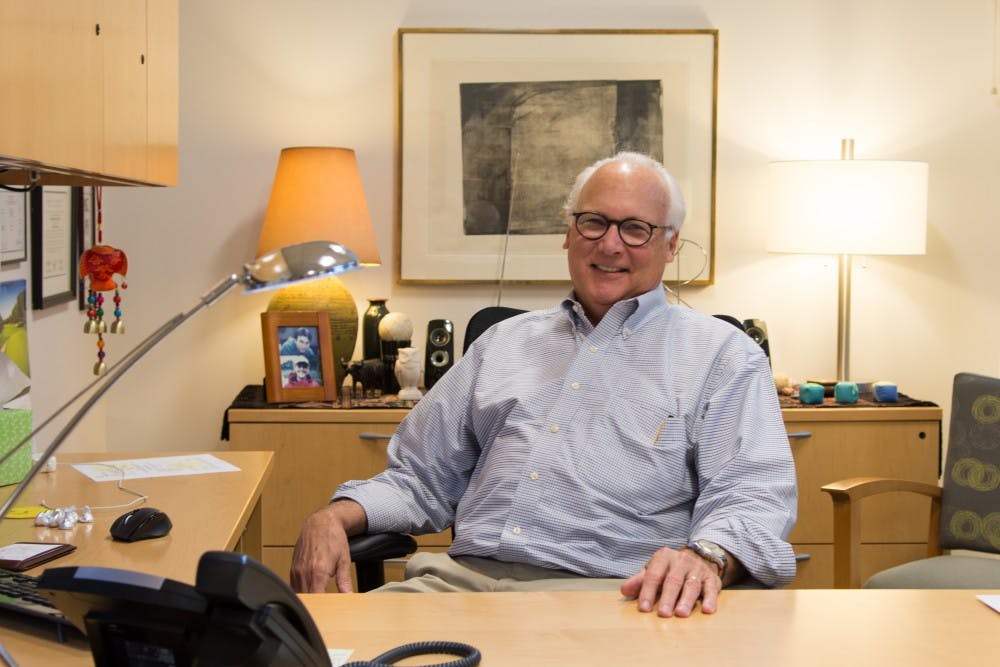In the nine years that Bill Alexander has served as Director of Counseling and Psychological Services, CAPS has undergone several major transformations, largely in response to great tragedy that has struck Penn's campus in more ways than one.
Alexander now prepares to retire on Aug. 31, but over the past decade, he has led CAPS through a period of growth and controversy. The past five years have been particularly notable for CAPS, which has come under tight scrutiny as mental health has emerged as one of the foremost student concerns.
As the University struggled with student deaths by suicide, many began to question the infrastructure in place to support the mental health and wellness of students on campus. CAPS — and Alexander — have been at the center of these conversations.
Students have criticized the center's lengthy wait times, short opening hours, and complicated referral system. Alexander has also had to deal more generally with charges that the University does not do enough for students' mental wellness. In response, CAPS, under Alexander's tenure, has launched several significant changes, including the I CARE training program, which now trains hundreds of Penn students, staff, and faculty to better understand how to manage the challenges of mental wellness.
“Alexander has presided over CAPS during a period of dramatic growth in staffing, outreach, and utilization,” Vice Provost for University Life Valarie Swain-Cade McCoullum wrote in a statement. “I am enormously grateful for Bill’s years of service and leadership to VPUL and the entire Penn community."

Alexander, who received a Ph.D. in counseling psychology from Temple University, was appointed as director of CAPS in the fall of 2009 after serving as deputy director for 10 years.
During his tenure, Alexander facilitated the January 2015 CAPS office shift from Walnut Street to Market Street and the gradual addition of 12 CAPS staff, he told The Daily Pennsylvanian. He said that the additional staff members promised by Penn President Amy Gutmann at the first "Campus Conversation" will be added over the summer.
Related:
CAPS moved to Market Street two years ago. Did this make mental health resources less accessible?
Increased staff and student demand leaves CAPS looking for more space
CAPS looks to address 'growing demand' for services with University review of operations
"The number of students wanting CAPS increases every year ever since I've been here," Alexander said, adding that CAPS expects to serve around 24 percent of Penn undergraduates in the next year.

That staff increase includes four staff that directly serve four Penn graduate schools through an "embedded model" that brings clinicians to graduate school buildings — a change that CAPS Director of Outreach and Prevention Services Meeta Kumar said Alexander was central in initiating.
Since then, CAPS usage rates have increased from 12 to 17 percent at graduate schools overall, according to Graduate Student Assembly President Miles Owen.
“He piloted the embedded model in graduate schools and was always really open to hearing our suggestions and working with us," outgoing Undergraduate Assembly President and College senior Michelle Xu said.
One of Alexander's projects was implementing CAPS' nighttime calls, Penn Benjamins Director of External Affairs Phil Isom said. Previously, students received a recorded response after business hours and would have to wait up to 20 minutes to reach a clinician by phone, according to Alexander. As of this semester, CAPS clinicians have been directly available by phone outside of normal CAPS' operating hours.
Alexander also helped student groups like Penn Benjamins with logistical issues like CAPS training, finding facilities, and receiving University funding.

"He was always willing to listen to students’ ideas and was [Penn Bens'] biggest advocate by far,” Isom said. “That helped me have a lot of confidence to lead Penn Bens and to do a lot of the mental wellness work that I’ve done. If someone of this authority is willing to listen to what I’m going to say, I’m more willing to listen to my own opinions."
As student demand for CAPS treatment grew in the past decade, students said Alexander made sure to continue conversations with student leaders from the UA, the Graduate Student Assembly, and CAPS Advisory Board.
“It’s more than just a job for him, it’s part of his life and who he is as a person,” Penn Wellness co-chair and College junior Serena Vargulick said. “His communication with student leaders was not in his job description. He would take time during the night whenever his work day was over and still made appearances at organizations because that was convenient for students.”
It's those students that Alexander said he will miss the most.
“That’s why we’re here,” Alexander said. “Penn students are the best in the world.”



